The first booster Covid vaccines were given to NHS and care workers today as the drive to top-up immunity in more than 30million Britons got up and running.
Staff at Croydon University Hospital in London gave the ‘thumbs up’ as they received their injection, just 48 hours after the booster scheme was signed off.
The Government’s vaccine advisory panel green-lit the move on Tuesday after weeks of deliberation, with over-50s, frontline workers and vulnerable Britons now eligible.
Its decision was vindicated last night when a major Israeli study on a million over-60s people showed a booster slashed the risk of severe Covid by 20-fold.
Eligible Britons are only being invited to come forward if they had their second jab at least six months ago, which officials said was the ‘sweet spot’ for boosters.
MailOnline’s analysis of official figures suggest only 1.6million Britons currently meet the criteria for top-up jabs, due to the six-month wait.
Third doses will be rolled out to the top nine priority groups during the initial drive, with the elderly, medics and carers first in line again.
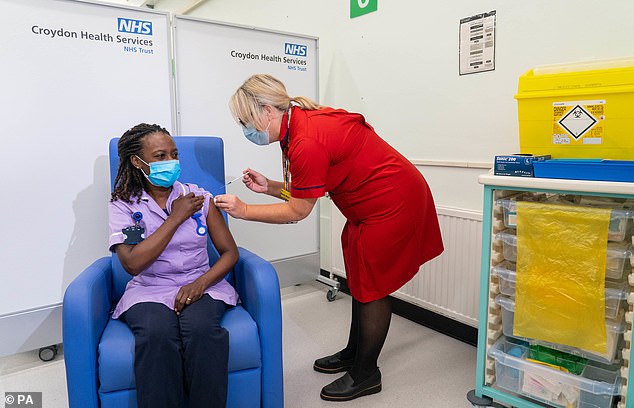
Maternity worker Catherine Cargill became the first person in the UK to receive a booster. The rollout comes barely 48 hours after the plans were signed off
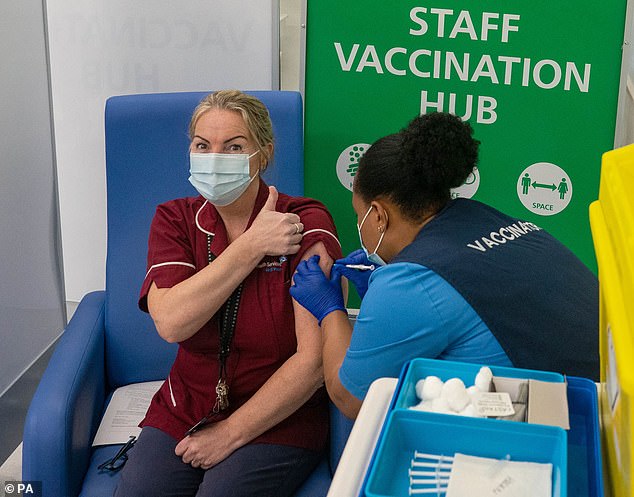
Dee Braim gives the thumbs up after receiving her third Covid jab at Croydon University Hospital, south London

MailOnline’s analysis of official figures suggests only 1.6million Britons are currently meet the criteria for boosters, due to the six-month wait. And the first 32million people were not fully immunised until June 24. However, this figure will include hundreds of thousands of under-50s, as uptake is no 100 per cent among those who are eligible for third doses. Boosters have to be given at least six months after the second dose, meaning the majority in the group may not be jabbed until November and December
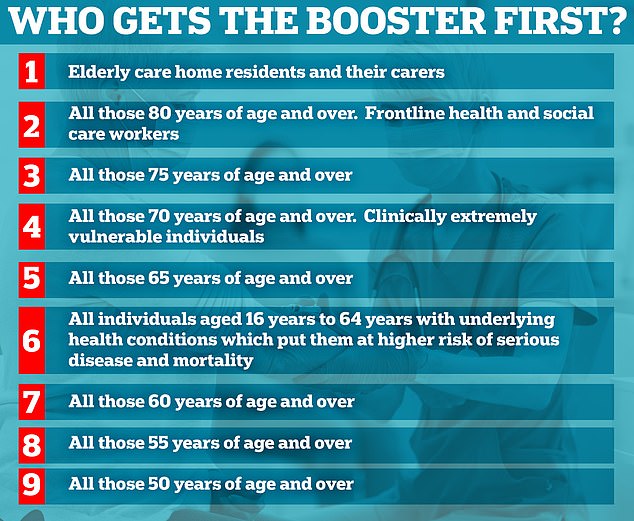
The above groups will be the first to receive doses of the Covid vaccine. Britain’s vaccine advisers say the ‘sweet spot’ for boosters is about six months after the second dose is administered. Booster shots are set to be rolled out in descending order from group one — elderly residents in care homes — to nine
Catherine Cargill, a maternity support worker at Croydon University Hospital, was one of the first people to get a booster today.
She said: ‘ I have had it ahead of the winter season to make sure I am protected, to make sure I can carry on working, I can carry on spending time with my family, and so I can carry on with my studies.
‘I would definitely want to encourage you to get your booster shot when you are invited to do that.’
NHS and care staff are being prioritised because they work with sick or elderly people who are the most susceptible to falling seriously ill with Covid.
Hospital hubs started vaccinating frontline health and care workers today and have began identifying other eligible patients.
GP-led local vaccination services will follow suit in the coming days, with mass vaccination centres and pharmacies to begin dishing out doses next week.

The decision to push ahead with boosters was vindicated last night when a major Israeli study on more than a million elderly people showed a booster slashed the risk of severe Covid by 20-fold. The research, led by the country’s health ministry, looked at more than 1.1million Israelis who had been double-jabbed for at least five months. The Y axis shows a reduction in likelihood to test positive for Covid after a booster, with a greater number representing a lower risk. The X axis is the number of days after the booster vaccine
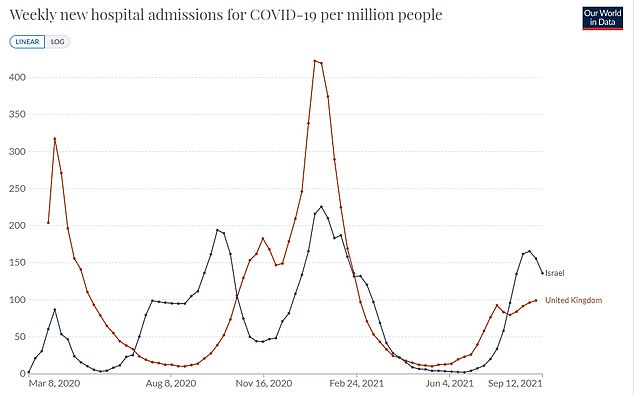
Israel pulled the trigger on a booster vaccine programme in August, which has stabilised the spiralling outbreak. The country recorded 136 hospital admissions in the week to September 12, down from the peak of 165 in the last week of August
Proof Covid booster vaccines work: Israeli data shows rates of severe illness were 20 TIMES lower
Over-60s given a booster Covid jab are 20 times less likely to fall severely ill with Covid than those vaccinated with two doses, a major Israeli study has found.
A third dose was also found to slash the risk of becoming infected with the virus tenfold, in the firmest piece of evidence yet that the UK was right to go ahead with a mass booster programme.
The research, led by the country’s health ministry, looked at more than 1.1million Israelis who had been double-jabbed for at least five months.
It found that people given a booster jab were 19.5 times less likely to be hospitalised with Covid than those who were still relying on protection from two doses and 11.3 less likely to test positive for the virus.
Both findings apply to the Pfizer vaccine, which Israel has relied on solely for its coronavirus immunisation programmes.
British experts hailed the findings as ‘spectacularly good’. They come just a day after the UK finally signed off on the campaign for 32million over-50s, health and social care staff and Britons with severe health issues.
Israel became the first country in the world to roll out third doses in August, initially inviting over-60s but later gradually opening it up to everyone over the age of 12.
Nearly 3m Israelis have been ‘boosted’ so far and the country but officials in the UK believe younger people are still enjoying very high protection.
Separate Israeli data also announced today showed a booster dose generates 10 times more antibodies than the second vaccine.
Medics at Sheba Medical Center in Ramat Gan, outside Tel Aviv, compared the antibody levels in staff one week after their third and second doses.
Advertisement
Eligible people will be contacted by the NHS to arrange an appointment, with 4.5million people in priority groups to be invited over the next month.
People will get a call or text from their local GP surgery, or will be invited by the National Booking Service, which will start issuing invitations from Monday.
Some of those in the original nine priority groups who’ve already been fully-jabbed will not be eligible for the top-up until December.
And data shows there are hundreds of thousands who are still yet to get their second jab.
Doses of the Pfizer jab, or a half dose of Moderna, will be administered as boosters, regardless of which jab they initially received, because studies showed they were the most effective at topping up immunity.
For those who cannot get either of those two mRNA jabs, such as due to an allergy, they will be given a dose of AstraZeneca’s vaccine.
A half dose of Moderna has been chosen because it was found to have fewer side effects but similar efficacy.
Dr Nikki Kanani, GP and deputy lead for the Covid vaccination programme said: ‘Alongside one of our busiest summers in the NHS, our hardworking staff have also been gearing up to deliver the autumn booster programme, to give further protection to healthcare and social care workers and those most at risk from the virus.
‘Now that the decision has been taken by the JCVI and once the relevant checks are in place, the NHS will invite you for your booster vaccination.
‘There is no need to contact the NHS – we will be in touch with you when it is your turn to get your booster vaccine – at least six months on since your last dose.
‘The fast preparations of staff to get ready for boosters comes on the back of our biggest vaccination drive in health history which has delivered more than 77 million vaccinations across the country.
‘Getting the vaccine remains the best way to protect yourself and those around you from Covid – so please do come forward for this top up of protection when you are invited.’
The booster rollout is the first phase of the Government’s winter plan to avoid another lockdown.
If hospitalisations rise quickly, ministers have warned they could be forced to reintroduce face masks and work from home guidance.
The Prime Minister was told it is better to act early, rather than dithering and having to go harder to fight off any surge later this year.
Government statistics show the UK hit 10million second vaccinations on April 18, meaning the third dose rollout will not be open to a third of those eligible until mid-October.
And it took until June 24 to administer 32million second doses, meaning those with waning immunity could be heading into the Christmas season with low levels of protection.
Last night, a study by Israel’s health ministry found over-60s given a booster Covid jab are 20 times less likely to fall severely ill with Covid than those vaccinated with two doses.
A third dose was also found to slash the risk of becoming infected with the virus tenfold, in the firmest piece of evidence yet that the UK was right to go ahead with a mass booster programme.
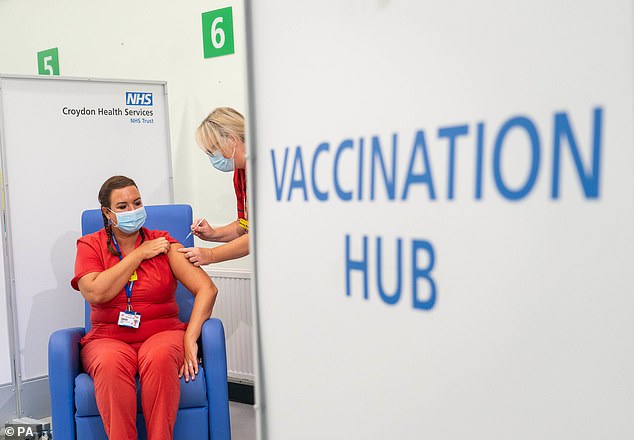
Mel Whiteley receiving a Covid booster jab. Eligible Britons are only being invited to come forward if they had their second jab at least six months ago, which officials said was the ‘sweet spot’ for boosters

Booster doses of the Pfizer jab, or a half dose of Moderna, are being administered after evidence showed they were the most effective
The research looked at more than 1.1million Israelis who had been double-jabbed for at least five months.
It found that people given a booster jab were 19.5 times less likely to be hospitalised with Covid than those who were still relying on protection from two doses and 11.3 less likely to test positive for the virus.
Both findings apply to the Pfizer vaccine, which Israel has relied on solely for its coronavirus immunisation programmes. British experts hailed the findings as ‘spectacularly good’.
Israel became the first country in the world to roll out third doses in August, initially inviting over-60s but later gradually opening it up to everyone over the age of 12.
Nearly 3m Israelis have been ‘boosted’ so far and the country but officials in the UK believe younger people are still enjoying very high protection.
Separate Israeli data also announced today showed a booster dose generates 10 times more antibodies than the second vaccine.
Medics at Sheba Medical Center in Ramat Gan, outside Tel Aviv, compared the antibody levels in staff one week after their third and second doses.
What is the booster, when will I get mine, and what version will it be? As the over-50s and vulnerable people are set to receive a Covid vaccine top-up before Christmas, we answer the vital questions
What is a booster jab?
It is a third dose of coronavirus vaccine intended to give greater and longer-lasting protection than the first two.
A study by Public Health England found immunity starts to wane around 20 weeks after receiving the second dose, particularly in the elderly.
This means people gradually become more likely to catch the virus, end up in hospital with severe disease or die.
A trial called CovBoost, which explored the impact of giving a third dose, found it increased antibody levels beyond that achieved with two jabs.

A study by Public Health England found immunity starts to wane around 20 weeks after receiving the second dose, particularly in the elderly. This means people gradually become more likely to catch the virus, end up in hospital with severe disease or die (stock image)
Who will get one?
Around 32million people in the UK will initially be offered it.
They include everyone in priority groups one to nine in the initial vaccine rollout.
This includes those aged at least 50, people living and working in elderly care homes, and frontline health and social care workers. All those aged 16 to 49 with underlying health conditions that put them at higher risk of severe Covid also qualify, as will adult household contacts of those with suppressed immune systems.
When will I get mine?
People should wait at least six months after their second dose, according to the Joint Committee on Vaccination and Immunisation (JCVI).
The NHS will start inviting people this week – vaccinations begin next week. Health officials hope to have offered a booster jab to all those eligible before Christmas.
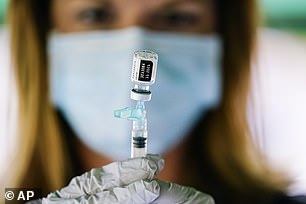
The NHS will start inviting people this week – vaccinations begin next week. Health officials hope to have offered a booster jab to all those eligible before Christmas (stock image)
Which version will I get?
The JCVI has recommended the use of the Pfizer/BioNTech vaccine, regardless of the one people received for their first and second doses.
A half dose of Moderna may also be used as a booster but the AstraZeneca/Oxford jab will only be used if patients are allergic to the others.
All three have been approved for use by the medical regulator, the MHRA, and are considered safe and effective.
Some vaccination centres or GP surgeries may only offer one type of jab, meaning people will not get to choose.
Will I still get my flu jab?
The NHS is embarking on its biggest ever flu vaccination programme and wants those eligible to have both jabs.
The MHRA has approved the use of the Covid and flu vaccines at the same time, saying this does not affect their safety or effectiveness.
It is possible one will be given in each arm, but it is likely many people will receive them on different days as they may need the flu jab before it’s their turn to have the Covid booster.
Source link : https://www.dailymail.co.uk/news/article-9997643/First-booster-Covid-vaccines-arms-NHS-care-staff.html











